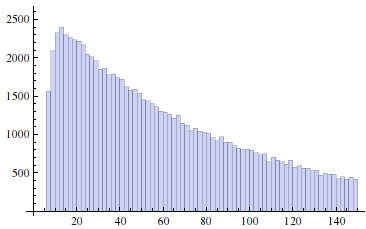One can use many simultaneous random chains. It considerably speeds up the simulation. Also we can implement own distribution (see Defining Distributional Generators here)
ClearAll[lifetime]
lifetime /: Random`DistributionVector[lifetime[size_, chains_ : 200], n_, prec_] :=
Module[{m, t, res, pos},
Flatten[Table[
m = ConstantArray[-1, size chains];
t = 0;
res = ConstantArray[0, chains];
While[Min[res] == 0, t++;
pos = Range@chains + chains RandomInteger[size - 1, chains];
m[[pos]] *= -1;
res += UnitStep[-res] UnitStep[Total@Partition[m, chains] - size] t;
];
res, {⌈n/chains⌉}]][[1 ;; n]]
];
Here size is the size of the list, chains is the number of simultaneous chains (the default value 200 is optimal) and n is the number of generated numbers. Now we can use it as a regular distribution with RandomVariate
N@Mean@RandomVariate[lifetime[6], 100000]
83.4748
Histogram[RandomVariate[lifetime[6], 100000], {0, 150, 2}, AxesOrigin -> 0]

The speed is several times faster then heropup's uncompiled version because I use packed arrayspacked arrays.
One can put the code above to Compile:
lifetimeCFun = Compile[{{size, _Integer}, {chains, _Integer}, {n, _Integer}},
Module[{m, t, res, pos},
Flatten[Table[
m = ConstantArray[-1, size chains];
t = 0;
res = ConstantArray[0, chains];
While[Min[res] == 0, t++;
pos = Range@chains + chains RandomInteger[size - 1, chains];
m[[pos]] *= -1;
res += UnitStep[-res] UnitStep[Total@Partition[m, chains] - size] t;
];
res, {⌈n/chains⌉}]][[1 ;; n]]
], CompilationTarget -> "C", RuntimeOptions -> "Speed"];
lifetimeC /: Random`DistributionVector[lifetimeC[size_, chains_ : 200], n_, prec_] :=
lifetimeCFun[size, chains, n];
The speed of my compiled solution is comparable to heropup's compiled solution.
